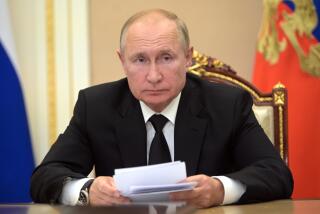CAPITALISM : U.S. Business Schools Take Act to Russia : American universities offer degree courses to eager students of free enterprise in the former Soviet Union.
- Share via
While the boom in graduate business education cools in the United States, American universities are finding eager new students of capitalism in places like Blagoveschensk, a bustling Russian river port on the Chinese border.
There, for the last six months, Portland State University has been offering an executive master’s degree in business administration program to 23 students who hope to export the region’s timber, gold and soybeans.
Though they have some difficulties with such topics as “human resource management,” all are hungry to compete in the free markets emerging from the collapse of the Soviet economic system.
“They feel they are starting to understand the mentality of business people who come from the West. They are becoming sort of assimilated to what is going on in the rest of the world,” said Elena Tihaja-Tishchenko, the Russia-based co-director of the Portland State program in Blagoveschensk.
Portland State sponsors similar schools in partnership with local groups in two other Russian cities: Khabarovsk, also on the Chinese border, and Novgorod, near St. Petersburg.
A few weeks ago, Cal State Hayward began an MBA program in Moscow with 44 students, linked to an economic institute there.
Despite the turmoil among Russian leaders over the direction of economic reform, UC Berkeley expects to help start a business school at the University of St. Petersburg next fall, and other U.S. universities have begun economics programs in the former Soviet bloc or are participating in faculty exchanges.
“They need the most basic information about economic issues,” Cal State Hayward President Norma S. Rees said of students she recently met in Moscow. “They have no idea what a lot of these things are, no concept of marketing, of cost, of what role free enterprise has in the economy.”
Despite those hurdles, Cal State Hayward’s two-year Moscow program tries to follow the school’s regular MBA curriculum as closely as possible, Rees said. California faculty will teach some Moscow courses and Hayward students will visit.
After preaching so long about capitalism, U.S. business and management professors feel a strong pull to help Marxist economies change, said Charles Hickman, an official with the American Assembly of Collegiate Schools of Business, a national accrediting agency. The group recently helped run a conference in Moscow on “How to Start and Run a Business School.”
Unlike the Hayward and Portland programs, most American-affiliated business education in the former Soviet Union will consist of short, non-degree seminars, Hickman said. Or, as in the UC Berkeley-St. Petersburg link, American professors will advise new institutions.
“The conditions in so many ways are so desperate there that hardly anyone has the time or resources to establish what you or I would consider an American-style MBA program,” Hickman explained.
After a lifetime in a state-run economy, some students have trouble with such concepts as objective ratings for bonds, said Alan W. Frankle, a Boise State University professor who recently taught a financial analysis seminar at Portland’s school in Blagoveschensk. “They kept asking why the ratings are not for sale,” he recalled with amusement. “Over there, everything was a deal, a bribe.” Still, he described his experience as gratifying: “These people are hungry for information.”
The new schools also face resistance from mainstream economics professors in Russia, whose education is still rooted in Marxism. Hyper-inflation, continuing political chaos and bureaucratic hassles also have discouraged some American universities from getting involved. Prof. Earl Molander, who helps run Portland State’s Russian business schools, recalled facing “management nightmares, legal nightmares, taxation problems, threats of one kind or another,” in setting up the programs. He insists, however, that the current conflicts between Russian President Boris N. Yeltsin and anti-reform forces will not affect existing programs.
A consortium of prestigious business schools--at Harvard, Stanford, Northwestern, University of Pennsylvania and Massachusetts Institute of Technology--will also bring 120 management and economics professors from Russia and Eastern Europe to the United States for retraining over the next two years.
However, Prof. David Teece of UC Berkeley’s Haas School of Business stressed it is just as important for American academics to visit Russia. “Seeing an economy in such rapid transition is of great interest to people who study economic systems and business organizations,” Teece said.
More to Read
Inside the business of entertainment
The Wide Shot brings you news, analysis and insights on everything from streaming wars to production — and what it all means for the future.
You may occasionally receive promotional content from the Los Angeles Times.









